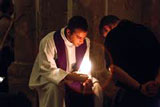It is also called the sacrament of Reconciliation, the sacrament of Forgiveness, the sacrament of Confession, and the sacrament of Conversion.
Since the new life of grace received in Baptism does not abolish the weakness of human nature nor the inclination to sin, Christ instituted this sacrament for the conversion of the baptized who have been separated from him by sin.
The risen Lord instituted this sacrament on the evening of Easter when he showed himself to his apostles and said to them, “Receive the Holy Spirit. If you forgive the sins of any, they are forgiven; if you retain the sins of any, they are retained.” (John 20:22-23).
The interior penance is the movement of a “contrite heart” (Psalm 51:19) drawn by divine grace to respond to the merciful love of God. This entails sorrow for and abhorrence of sins committed, a firm purpose not to sin again in the future and trust in the help of God. It is nourished by hope in divine mercy.
The essential elements of the sacrament of Reconciliation are: the acts of the penitent who comes to repentance through the action of the Holy Spirit, and the absolution of the priest who in the name of Christ grants forgiveness and determines the ways of making satisfaction.
The acts of the penitent are: a careful examination of conscience; contrition (or repentance), which is perfect when it is motivated by love of God and imperfect if it rests on other motives and which includes the determination not to sin again; confession, which consists in the telling of one's sins to the priest; and satisfaction or the carrying out of certain acts of penance which the confessor imposes upon the penitent to repair the damage caused by sin.
All grave sins not yet confessed, which a careful examination of conscience brings to mind, must be brought to the sacrament of Penance. The confession of serious sins is the only ordinary way to obtain forgiveness.
Each of the faithful who has reached the age of discretion is bound to confess his or her mortal sins at least once a year and always before receiving Holy Communion.
The confession of venial sins is strongly recommended by the Church, even if this is not strictly necessary, because it helps us to form a correct conscience and to fight against evil tendencies. It allows us to be healed by Christ and to progress in the life of the Spirit.
Christ has entrusted the ministry of Reconciliation to his apostles, to the bishops who are their successors and to the priests who are the collaborators of the bishops, all of whom become thereby instruments of the mercy and justice of God. They exercise their power of forgiving sins in the name of the Father and of the Son and of the Holy Spirit.
The effects of the sacrament of Penance are: reconciliation with God and therefore the forgiveness of sins; reconciliation with the Church; recovery, if it has been lost, of the state of grace; remission of the eternal punishment merited by mortal sins, and remission, at least in part, of the temporal punishment which is the consequence of sin; peace, serenity of conscience and spiritual consolation; and an increase of spiritual strength for the struggle of Christian living.

